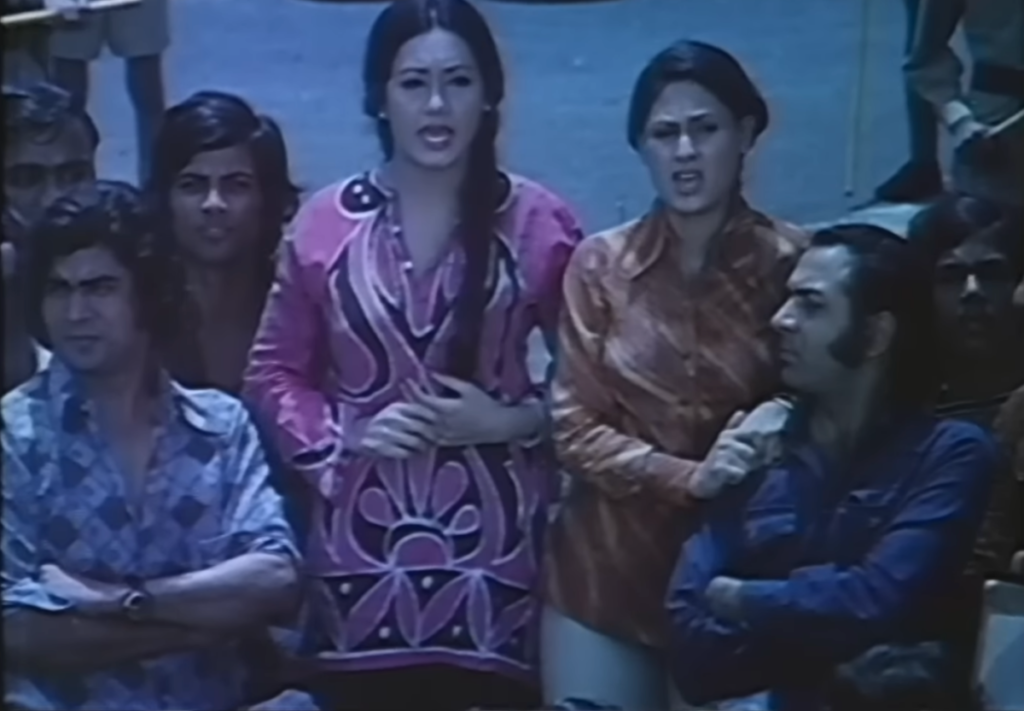
Those who follow Hindi cinema’s history and lore would be familiar with Roshan Taneja’s place in it. The veteran acting coach is recognized for training generations of Bollywood actors including Madhuri Dixit, Anil Kapoor, Govinda, Naseeruddin Shah, and Shabana Azmi. In 1977, Taneja directed Abhi To Jee Lein, his sole directorial credit. This campus drama is centred around student politics. It features Jaya Bhaduri, Danny Denzongpa, Kiran Kumar, Radha Saluja and a bunch of other young actors who had studied under Taneja at the Film and Television Institute of India (FTII) in Pune.

Stories surrounding the youth formed a significant part of ’70s Hindi cinema. Jawani Diwani (1972), Bobby (1973), Khel Khel Mein (1975) had young hearts romancing and rebelling against the old guard; Mere Apne (1971) explored the angst and aimlessness of the unemployed youth; Imtihan (1974) and Anjaan Raahen (1974) discussed sexual curiosity among young people and the taboo surrounding sex.
Throughout the ’70s, multiple students movements spread across the country including the underground protests against the State imposed Emergency in 1975. Several campuses witnessed protests over fee hikes and administrative corruption. Students clashed with the police, who used brute force to clamp down the dissent. This state of upheaval reflected in our films too. They routinely depicted the strikes, gherao, and political clashes in college campuses. Most films took a safe, predictable stand on this — a general lament about educational institutions turning into a den of politics and how it was detrimental to the future of the youth.
Abhi To Jee Lein, too, addressed the conflict between students and authority figures. Though not much information is available, the film seems to have been made in the early career days of Jaya and Danny but got a delayed release. The narrative unfolds from the students’ perspective — their struggle with generation gap and patronizing behaviour, facing a hostile administration, and dealing with ideological differences and violence in the campus.
While a faction of students believe organized assertion, even if it takes an aggressive turn, is the only way forward, others oppose it. Then, there are the self-seeking sycophants who serve their political masters and benefit from this state of unrest.

What’s striking about Abhi To Jee Lein is the refreshingly different portrayal of how young women and men interact on the campus from what one usually sees in popular Hindi cinema. When one thinks of the depiction of college life on screen, it’s mostly young men and women existing in separate spaces and treating one another with curiosity or caution or cluelessness. Our films are filled with numerous scenes, songs, and themes of men teasing, playing pranks, and even harassing women to convey a warped idea of fun, friendship, and romance on campus.
Moreover, tropes like gawking guys struggling to approach their female classmate(s), men and women pitted against each other, or else exchanging shy, furtive glances were common. In Abhi Toh Jee Lein, friendship and camaraderie between the two sides is done in a balanced and relatable fashion. There’s a great deal of candour and effortlessness in how the film presents the youth. Young women and men are mingling, interacting, bantering, and arguing with each other. College issues and politics get discussed, differing views are challenged, student solidarity is sought. No casual sexism or chauvinism.
Jaya plays a forthright students leader who is well respected by her peers. Her male friends and her boyfriend, Danny acknowledge her dynamism and support her wholeheartedly. Jaya and Danny’s relationship too, is cool and functional. They are good friends and are at ease with one another. Danny often visits Jaya’s house and has a cordial relationship with her mother. The film’s other couple Rita (Radha Saluja) and Deepak (Kiran Kumar) also have an interesting dynamic. Rita doesn’t share Deepak’s views on how campus politics should be practiced.
It usually happens in our movies, that the woman is portrayed negatively for not supporting her man. However, Abhi To Jee Lein doesn’t do that. It shows the characters just as they are: two individuals with a mind of their own. Be it Jaya, Rita or the progressive Ms Mahajan (Simi Garewal) — college’s new lecturer: the women in the film are independent-minded and speak up.
And it’s refreshing to see them share spaces with men not as an oddity but like friends, allies and equals. Even more so to have male characters that call out sexist and regressive behaviour. When an older male colleague makes an inappropriate remark towards Ms Mahajan, a group of boys in her class rise up demanding the strictest action against the offender. For students dissenting against conservatism and corrupt practices, this becomes the flashpoint for a strike.

Despite being sympathetic to the students’ cause, Abhi To Jee Lein also looks at the grim realities of campus politics — violence, lawlessness, and lost lives. The film doesn’t reduce the debate to a students versus teachers binary. It’s prudent enough to highlight positive associations between the two. And that, a way to get the youth to respond constructively is by talking to them and not at them.

